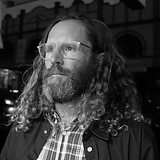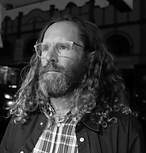Designing a project can be an engrossing and all-consuming experience. But when the job is over, the transition to "civilian life" if often challenging. Our colleagues share experiences and offer advice.

Brant Fraser
"Each job is a learning experience, and you have allowed yourself the room to grow and to fail. You did the best you could. So spread a bit of that love to yourself."

Melanie Garros
"In a way, the separation feels like a good breakup - you know it is for the best and normal but it is still difficult and leaves you alone."

Eve McCarney
"For that length of time, the crew is your family and the project your world. It’s one of the things I love most about this career”.

Gino Fortebuono
"The simple things that most people might take for granted become the most valuable."
July 28th, 2019
How do you get over the attachment to project and crew once the job is over?

Brant Fraser
Brant Fraser started his career making coffee in craft services and doing production work in London and New Zealand, before moving into camera and then settling into the art department 15 years ago. Based in Auckland, New Zealand, his credits include features "The Breaker Upperers", "Beyond the Known World", "The Last Saint ","Fantail", TV series "Wanted" and "Jaquie Brown Diaries" and various commercials.
The transition out of each project has become a much larger focus in recent years, as I have become increasingly aware of the importance of putting myself in the best place to move back to so called "Normal" Life.
Early in my career, the ending of project would normally be met with period of partying and celebration, followed by a big crashing come down. Often met with self doubt, and regret over some aspect of the job, and some times fractured relationships with colleagues.
No matter what, there will always be a natural come down after each project or period of intense work. But I have found that the way in which you end the job can really help put you in a better place to be able to bounce back.
Relationships with your team and the rest of your colleagues will often be the most challenging part of the job. Conflicts will be natural. So no matter what has transpired during the project, I now try and make peace with those relationships and let everyone know how grateful I am for their involvement and the hard work they have put in. Sometimes it can be hard and frustrating, but I have to remember that everyone is doing the best that they can. And pressure affects people in all different ways, so it is very rarely personal. By putting some time and effort into this, it really helps me feel better, and spreading some love really does help squash a lot of the negative emotions that inevitably arise during production. And of course, these are all people in your industry, so it's highly likely you'll end up working with them again at some stage.
Each project begins with lofty hopes and dreams. During production some of your work will end up better that you ever could have imagined, but there will always be things that were failures. It is the nature of who we are as designers, that we will always struggle to be satisfied with our work, there is always room for improvement. And as creators, the work becomes our little creative children, so it can really hurt to see one fail. Or maybe it was filmed in a rush, lit in a way we didn't like, or cut completely from the final product. This hurts, but is all out of our control. So I have really begun to focus more on the process of the work, and taking satisfaction from that. And making sure that I try to come to terms with, and address it before the job is over and we all move on. Each job is a learning experience, and you have allow yourself the room to grow and to fail. You did the best you could. So spread a bit of that love to yourself.
Once the job is over, hopefully you can crash in a heap for a day or two, but without a lot of the negative attachments and self doubt. I try and give myself as much time as I possibly can to recharge and reconnect with family and friends, but also I make time for personal space. Being alone as a designer rarely happens for long. The days are a constant stream of meetings, calls and emails. So when they all stop and the job is over I need to have time to be alone in my own space. For me going surfing is the perfect time for that, to reconnect to myself.
Normally life gets pushed aside during production, so the looming chance of free time also comes with a long list of things you need to do, and a long list of all the things you want to do. It's natural that there's lots to catch up on, but putting pressure on yourself to achieve a lot when you have just finished a big project is not helpful. So I have found making a daily list of no more than a couple of things, and focusing on just achieving one or two is great. Get something done, then relax. Go surfing, read a book, hang with your family. Rest up, re fill your cup, tomorrow's another day.
There is often sadness that all the great people you were spending your days with are no longer around. And you may have been away on location and in some sort of magical bubble where all that mattered was the job and the story you were telling. But that is the nature of our jobs, everything comes to an end. And the magic of our jobs is that you never know what new adventure is just around the corner.

Eve McCarney
Eve McCarney is the production designer of “The Ballad of Lefty Brown,” “Laboratory Conditions,” “The Tank,” “Street Survivors,” “The Late Bloomer,” and season 1 of Fullscreen’s “Alive in Denver.” She has just wrapped the second season of “Liza On Demand” for Youtube Premium.
Wow, what a great question! This was the most challenging thing I struggled with when first transitioning into the film industry.
After college, I embarked on my career in New York City; first as a graphic designer for the daily newspaper amNewYork and then later as an art director for the ad agency Agent 16. Both jobs required occasional late nights, weekends or holidays, but overall were mostly standard nine-to-five gigs. Steady paychecks, the same co-worker’s day in and day out and duties over and over. This monotony brought me to evaluate my career path and figure out if there was something else more attuned to my talents and
passions. After months of soul-searching and research, I found myself at a defunct prison in Queens art directing a short film called Officer Down. I knew the instant I stepped onto the set that I had found my calling. It was the opposite of everything I knew in the corporate world; thrilling, ever-changing and multi-faceted. What I couldn’t foresee was the flip side to a career in production.
It was after my second job in Los Angeles that I initially experienced this profound sense of loss. The project was a small feature, and I truly connected to the crew and excitement of the ever-changing landscape, daily challenges and creating on the fly. It was such a whirlwind. Going from high gear to a stand-still was shocking. Almost as if it never happened, like a fever dream. I mourned the project for a while and struggled to find a balance to my newfound freedom. Money was tight then, so there weren’t lots of options for recreation. I ended up hitting the library armed with Lynda Sketchup Pro tutorials to enhance my skill set.
I have always found myself so completely consumed by the process. I relish the hours of research, scouting, the camaraderie and late nights. For that length of time, the crew is your family and the project your world. It’s one of the things I love most about this career.
Over the years, I’ve adopted a strategy whereupon finishing a job I give myself a week to recuperate, laze around and indulge in movies, brunches, and fun with friends. After that, I’m back at it working out six days a week (hiking, yoga, boxing, and swimming) and scheduling my time between professional enrichment, industry events, portfolio revamping or working on new art projects. Usually, right about the time, I’m into a groove I book my next project.

Melanie Garros
After discovering different film techniques around the world, Melanie Garros has decided to settle in Toronto, Canada. Since, she has made herself a name in the Independent filmmaking. Recently, she designed Carly Stone’s "The New Romantic" which premiered in SXSW 2018. Her other films credits includes "Black Conflux", "White Lies", "Like a house on Fire" and "Becky", all features yet to come out.
It always has been a struggle of mine, once a project is ending, to go back to a more regular life. Especially if you don’t go from one to another or if it ends during the winter time.
I now have the chance to choose every movie that I take on, so I do so for the love of the scripts. I invest myself a 100% in it for it’s duration. It can be for just a week or over a couple of months. Once the project comes to life, it can almost feel like you have become a part of it.
While you’re working on a project, you spend more hours with your team working on the design and execution of it, than with your family or your partner. But the moments you are spending with the crew are timeless. You share so much intensity and complexity that you have the feeling you’ve known them for much longer. After the last shot is called, when the shooting team goes home, you luckily have a little more time to see your crew and collaborators again for wrap but after that, everyone goes in a different direction. It is generally a week later that the "post project blues" hits me.
I then finds myself in a limbo period. I am obviously happy to be with my family and do all of things I had paused on during the project, but I want to see and catch up with everyone. If you are also in the unknown about what and when will be your next project, you find yourself with too much time to think on your hands, to remember all of the good moments and all the thing you wished you have been able to include in your design. In a way, the separation feels like a good breakup - you know it is for the best and normal but it is still difficult and leaves you alone.
In my experience, I have found that the best way to deal with it is to allow it to happen. Try to not fight it but be happy and grateful that you have had the chance to work on that project. During this period of time, I try to stay as creative as possible even it is not film-related. I try to see all of my other friends that I haven’t seen during production. And I also stay in touch with the director and producers during post production.
Find out your recovery process will be, what will work for you. Soon enough you will be receiving the announcement about the project’s release, and everyone will be reunited to celebrate and to be proud of what has been accomplished. Every job is a roller-coaster, you know once you sit in that car that you are embarking on a long wild emotional ride that won’t end until you will be seating in a theatre, or once you will be leaving the amusement park at the end of your carrier.

Gino Fortebuono
Gino Fortebuono is a production designer and prop master based in Brooklyn, NY. Notable prop master credits include Rick Alverson's "The Mountain" and Andrea Arnold's "American Honey". Gino's most recent production design pieces include Sarah Daggar-Nickson's "A Vigilante" and Fernando Frias' "Ya No Estoy Aqui".
For a few years now, I’ve been splitting my time between Production Designer and Prop Master. I approach these roles much differently in practice, but one thing remains a constant: once a project begins, I have a really hard time turning my brain to another channel. Nights, weekends, early mornings before call, I find my mind constantly, endlessly, devoted to the work. It’s all or nothing. My work is a part of my identity, and if I don’t fully immerse myself in it, I feel as though somehow I’ll be doing an injustice to the project, and my department, and ultimately, myself. For me, it’s a personality thing that has gotten me into trouble, emotionally.
So, when Inbal asked me to think about how I get over a project and crew once it’s wrapped, I jumped at the chance to really give it a good long think. It’s a question that I’ve actually never asked myself.
I think it’s important to note that most of the work I’ve been doing is on a small scale. I’m running tiny departments and budgets that are…let’s say, stressful. It’s not uncommon that, in addition to my research, scouting, drawing, endless emails, and managerial notes, I find myself painting my own sets and sometimes doing a little bit of my own construction. This physical workload is exhilarating for me (at least for now, while I’m young), and the physical connection to a project, for me, is everything. It is a sacrifice I’m happy to make with my body for the benefit of story. And then, suddenly, it’s over.
When a project wraps, my body will almost immediately shut down, and sometimes I get sick. The film I just wrapped in June left me laid up in bed for almost a week. Texts and emails come to a halt. Nobody is relying on me for a work list or a drawing or a new task, and the community that I’ve been surrounded by for months is suddenly absent. I’ve been chewed up and spit out. Frankly, it can feel quite awful. But pain is temporary. Eventually, I regain my physical strength, and it’s back out into the real world. It’s time to reconnect with my family and close friends, go to the beach, enjoy my record collection, cook a meal at home, take selfies with my cats. The simple things that most people might take for granted become the most valuable, for me. Basic acts of self-care are critical elements in helping me recharge and pick up my life in New York.
If I’m lucky, I don’t stay unemployed for too long, and I’ll get to do it all over again with a new story, a new crew, in a new place, and hopefully, with a new sense of perspective that I’ve gained from that last project. Since my last film wrapped, I’ve been really missing our Props 3rd, Rhonda, and our Costume Designer, Susan. They’re both on the other side of the country, so we’re all making plans to see each other next winter. It’s such a privilege to work in an industry where I constantly have the opportunity to collaborate with so many lovely, talented folks. I take comfort in knowing my work family will continue to grow. It’s what keeps me going from project to project. I can’t wait to do it all over again.
